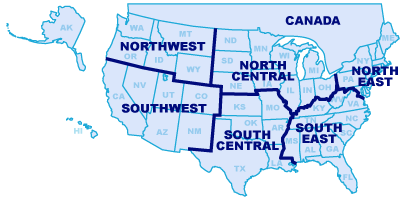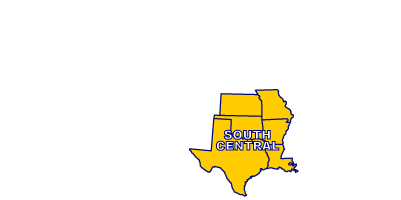Christian Colleges with Special Education Degrees
The Christian colleges included here offer your major of interest. You may read through the articles to learn more about your major of interest. You may also select the schools you'd like information from and click "Continue" under the list of schools. The Christian Connector and those schools that you request information from will receive the information you provide on the form so they can respond and meet your information request. Once the form is completed, you'll automatically be entered to win one of four $500 Visa Gift Cards.
Click on the map below to bring schools in the selected region to the top of the list:








Articles on Special Education:
Special Education Majors at Christian Colleges
Article by Rachelle Wiggins
“Every child deserves a champion: an adult who will never give up on them, who understands the power of connection and insists they become the best they can possibly be.”
~Rita Pierson, Educator
None of us are untouched by disability. Whether it is a family member, friend or just an acquaintance, we are all aware of those who struggle with some degree of cognitive, emotional or physical limitation. Special education is a subspecialty of education that focuses on teaching K-12 children who have learning needs or disabilities. Few careers are as challenging, yet rewarding as those in the important field of special education! Many who major in special education possess a sense of calling to this helping profession where the goal is to assist disabled children gain life skills and reach their highest potential. In this major, you will learn about specific disabilities such as ADHD, autism, dyslexia and orthopedic, audio or visual impairment. Whether you end up teaching children with mild or more severe disabilities, you will become proficient in special education topics such as classroom management, social-emotional learning and writing IEPs (individual education plans). You will also learn strategies for intervention, curriculum adaptation and assessment within an inclusive classroom or resource room. If you are fascinated by the process of learning, enjoy instructing others and genuinely love children with special needs, then this may be just the major for you!
Beyond these passions, what are some of the other traits needed in order to thrive as a special education major? Flexibility, creativity and adaptability are important as you will constantly improvise the way you teach, based on students’ individual needs. Since special education entails juggling many “moving pieces” like constant planning, instructing, administrating and assessing, strong organizational skills are imperative, as well. Good communication skills are also a must. This applies to classroom instruction, but also when working on a broader team of administrators, educators, and parents. Finally, compassion, patience, strong intuition and a calm, even nature are essential in a profession that is highly relational, demanding and filled with diverse learners with varying academic, social, emotional and physical needs.
As an education major, you can expect to take core classes and then complete classes on pedagogy (teaching methods and practice) as it relates to special education. You will engage in hands-on teaching exercises and spend time observing teachers in special education settings. You will conclude your college experience with a semester of student teaching where a mentoring teacher will guide you and give feedback about your instruction. Courses you will likely take include:
- Educational psychology
- Developmental psychology
- Child assessment
- Special education law
- Learning acquisition
Once you have your special education degree, the career opportunities are ever-expanding. Special education majors are not only employed in all sorts of school settings, but also in hospitals, daycare centers, public or private residential facilities, government or non-profit organizations, mental health facilities, and residential therapeutic camps. Though the majority of special education graduates teach students in a more traditional, academic setting, there are other career options to consider:
- Early intervention specialist
- Creative arts or recreational therapist
- Autism spectrum disorder specialist
- Hospital pediatric educator/advisor
- Special education policy-maker or advocate
If you feel eager to truly make a difference in the lives of the disabled and impacting future generations through your compassionate care and instruction, then perhaps God is prodding your heart towards a major in special education!
A future in Special Education
By Jennifer Bailey
So, you love kids with challenges? Would you love to help them grow and learn? A degree in special education prepares students for a career as a teacher specifically for K-12 students who specifically have mild to moderate disabilities; either mentally, physically, socially and/or emotionally delayed. This aspect of “delay,” broadly categorized as a developmental delay, signifies an aspect of the child's overall development whether physical, cognitive or scholastic and places them behind their peers. Due to these special requirements, students’ needs cannot be met within the traditional classroom environment. Special education programs and services adapt content and teaching methods in order to meet the appropriate needs of each child. Special needs children could have multiple disabilities that include Autism or a traumatic brain injury. They may have speech or language impairments, be hearing impaired, deaf, blind or both, they may have emotional disturbances, developmentally delayed or have orthopedic needs or simply be ADHD. There is a broad spectrum under the special education umbrella, and you will potentially work with all of the above over the course of your career in this amazingly rewarding field.
In all cases, the first step toward a career as a special education teacher is earning a bachelor’s degree. Coursework typically includes classes in subjects such as child assessment, educational psychology, behavior support, communication techniques and disabled student instruction. Degree programs in special education on both the bachelor’s and master’s levels are abundant and offered by both public and private colleges and universities both offline and online.
You will find many jobs available to you once you graduate; however, it is worth noting that special education teachers have a higher rate of burnout than is found in most other professions. The burnout rate is the result of a number of issues; and, sadly the result of this turnover rate is a shortage of special education teachers and a lack of quality programs for the students they serve.
Some of the issues that special education teachers face are: (1) the misperception that teaching is easy. It is actually a uniquely difficult job and one that comes with huge responsibilities and is largely unrecognized and unsupported by the public, (2) many teachers are trained and willing to teach but find themselves burdened with other responsibilities that keep them out of the classroom because they are required to go to meetings, conduct assessments and deal with loads of paperwork, (3) there is also the issue of having to work with children who have multiple disabilities so the teacher must modify their lessons to suit each disabled learner by providing individualized education programs, (4) an unexpected issue many teachers don't expect to face is the death of one of their students as students in this setting often have severe and chronic illnesses that may result in death. This can certainly be a challenge to which you would have to adapt and, (5) there can also be the feeling of isolation- as the nature of your work would be different than that of a traditional teacher.
Any one of these challenges would make the work of a special education teacher incredibly difficult. If you desire to go into this incredibly rewarding area of teaching, please be aware of the issues you will likely face and be sure you are a person with a deep love for the downcast and broken. Be sure you have the mental and emotional fortitude to overcome these challenges. Your efforts will change these special lives forever and you will be blessed.